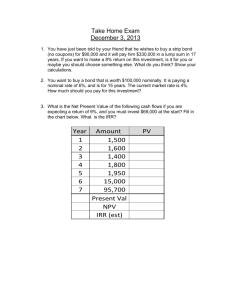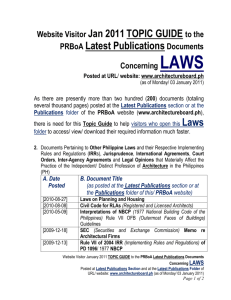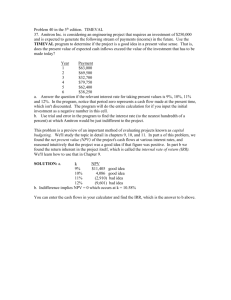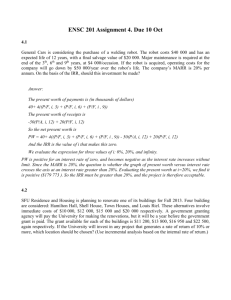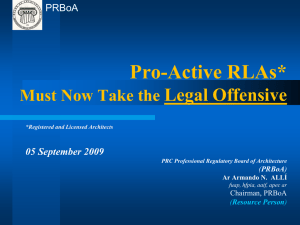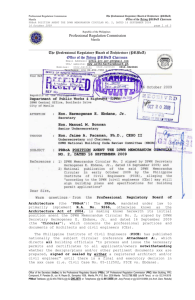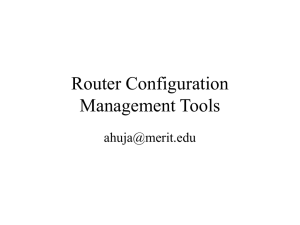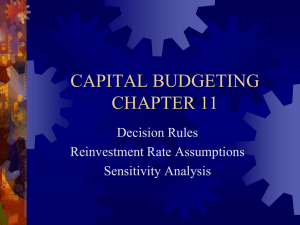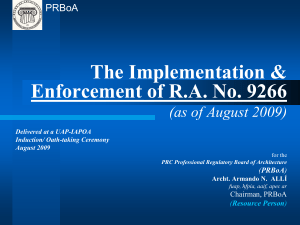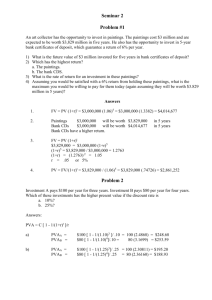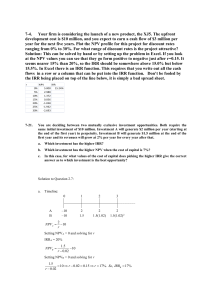RLAs & The Law Regime - Reconstituted Professional Regulatory
advertisement
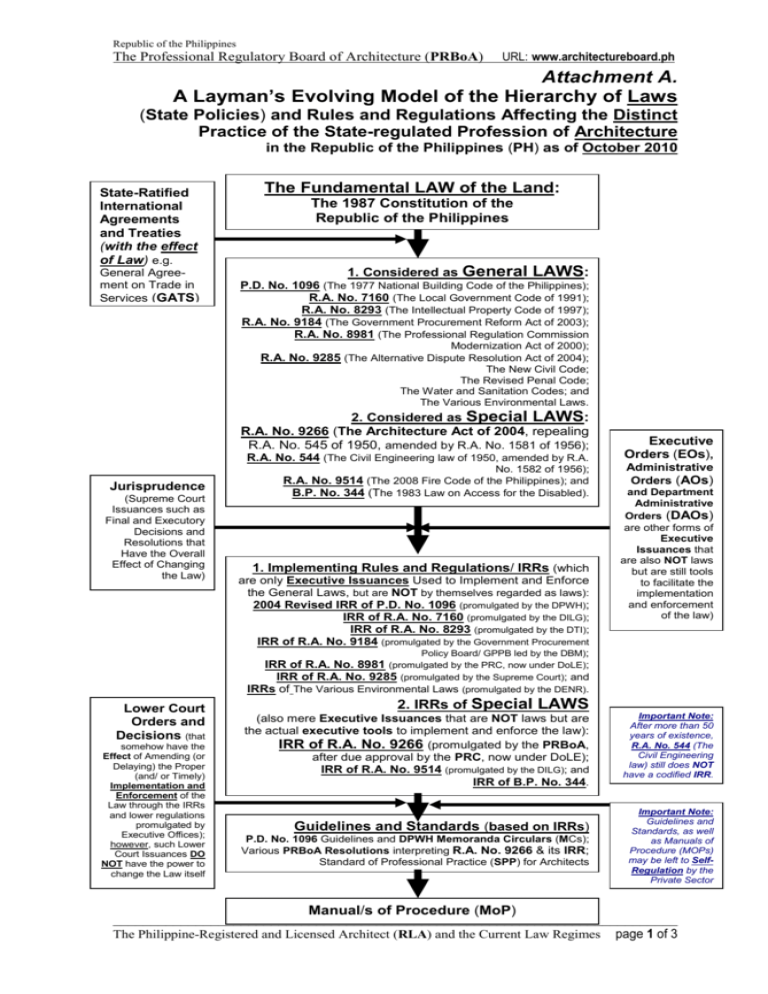
Republic of the Philippines The Professional Regulatory Board of Architecture (PRBoA) URL: www.architectureboard.ph Attachment A. A Layman’s Evolving Model of the Hierarchy of Laws (State Policies) and Rules and Regulations Affecting the Distinct Practice of the State-regulated Profession of Architecture in the Republic of the Philippines (PH) as of October 2010 State-Ratified International Agreements and Treaties (with the effect of Law) e.g. General Agreement on Trade in Services (GATS) The Fundamental LAW of the Land: The 1987 Constitution of the Republic of the Philippines 1. Considered as General LAWS: P.D. No. 1096 (The 1977 National Building Code of the Philippines); R.A. No. 7160 (The Local Government Code of 1991); R.A. No. 8293 (The Intellectual Property Code of 1997); R.A. No. 9184 (The Government Procurement Reform Act of 2003); R.A. No. 8981 (The Professional Regulation Commission Modernization Act of 2000); R.A. No. 9285 (The Alternative Dispute Resolution Act of 2004); The New Civil Code; The Revised Penal Code; The Water and Sanitation Codes; and The Various Environmental Laws. 2. Considered as Special LAWS: R.A. No. 9266 (The Architecture Act of 2004, repealing R.A. No. 545 of 1950, amended by R.A. No. 1581 of 1956); R.A. No. 544 (The Civil Engineering law of 1950, amended by R.A. Jurisprudence (Supreme Court Issuances such as Final and Executory Decisions and Resolutions that Have the Overall Effect of Changing the Law) No. 1582 of 1956); R.A. No. 9514 (The 2008 Fire Code of the Philippines); and B.P. No. 344 (The 1983 Law on Access for the Disabled). 1. Implementing Rules and Regulations/ IRRs (which are only Executive Issuances Used to Implement and Enforce the General Laws, but are NOT by themselves regarded as laws): 2004 Revised IRR of P.D. No. 1096 (promulgated by the DPWH); IRR of R.A. No. 7160 (promulgated by the DILG); IRR of R.A. No. 8293 (promulgated by the DTI); IRR of R.A. No. 9184 (promulgated by the Government Procurement Executive Orders (EOs), Administrative Orders (AOs) and Department Administrative Orders (DAOs) are other forms of Executive Issuances that are also NOT laws but are still tools to facilitate the implementation and enforcement of the law) Policy Board/ GPPB led by the DBM); IRR of R.A. No. 8981 (promulgated by the PRC, now under DoLE); IRR of R.A. No. 9285 (promulgated by the Supreme Court); and IRRs of The Various Environmental Laws (promulgated by the DENR). Lower Court Orders and Decisions (that somehow have the Effect of Amending (or Delaying) the Proper (and/ or Timely) Implementation and Enforcement of the Law through the IRRs and lower regulations promulgated by Executive Offices); however, such Lower Court Issuances DO NOT have the power to change the Law itself 2. IRRs of Special LAWS (also mere Executive Issuances that are NOT laws but are the actual executive tools to implement and enforce the law): IRR of R.A. No. 9266 (promulgated by the PRBoA, after due approval by the PRC, now under DoLE); IRR of R.A. No. 9514 (promulgated by the DILG); and IRR of B.P. No. 344. Guidelines and Standards (based on IRRs) P.D. No. 1096 Guidelines and DPWH Memoranda Circulars (MCs); Various PRBoA Resolutions interpreting R.A. No. 9266 & its IRR; Standard of Professional Practice (SPP) for Architects Important Note: After more than 50 years of existence, R.A. No. 544 (The Civil Engineering law) still does NOT have a codified IRR. Important Note: Guidelines and Standards, as well as Manuals of Procedure (MOPs) may be left to SelfRegulation by the Private Sector Manual/s of Procedure (MoP) ___________________________________________________________________________ The Philippine-Registered and Licensed Architect (RLA) and the Current Law Regimes page 1 of 3 Republic of the Philippines The Professional Regulatory Board of Architecture (PRBoA) URL: www.architectureboard.ph Attachment B. Matrix Showing the Status of Key Laws (State Policies) and Rules and Regulations Presently Affecting the Distinct Practice of the State-regulated Profession of Architecture in the Republic of the Philippines (PH) as of October 2010 B. IRR C. Important Provisions/ NonProvisions D. Short History/ Comment C. Status as of end-Oct 2010 2004 Revised IRR of P.D. No. 1096 (promulgated by the DPWH n Oct 2004, published thrice in April 2005 & effective 01 May 2005) P.D. No. 1096 Sec. 302 NEVER stated that civil engineers can sign and seal architectural documents; the Sec. 302.3 and 302.4 of the 2004 Revised IRR clearly LIMIT to Architects the signing and sealing of architectural documents, in full harmonization and compliance with the dictate of law (specifically, with the multiple provisions under R.A. No. 9266) On the basis of the intercalated text of Sec. 302 of P.D. No. 1096, purporting that civil engineers (CEs) can sign and seal architectural documents, the CEs managed to secure a May 2005 preliminary injunction on Secs. 302.3 and 302.4 of the 2004 Revised IRR of P.D. No. 1096; the said 2005 preliminary injunction was already lifted/ dissolved by the Court in early 2008 There is apparently NO TRO and no injunction against Secs. 302.3 and 302.4 of the 2004 Revised IRR of P.D. No. 1096 b) R.A. No. 7160 (The Local Government Code of 1991), c. late 1991 Municipal/ City Engineers (a position under the DILG) are only to assume the post of Building Official (a position under the DPWH) only in an Acting capacity Since the planning and design of buildings and their environs is an expertise of the Architects (as compared to CEs who are tasked to design the structure that supports the building), the Architects (who are properly qualified by their academic and sub-professional training,licensure examination and continuing professional education) must be appointed to all Government positions requiring dedicated work for buildings c) R.A. No. 8981 (The Professional Regulation Commission Modernization Act Jurisdiction over all State-regulated professions rest solely with the PRC and its Professional Regulatory Boards (PRBs) such as A. The LAW and Effectivity Date/ Year 1. General Laws a) P.D. No. 1096 (The 1977 National Building Code of the Philippines), 1977 which clearly LIMIT to Architects the signing and sealing of architectural documents; the May 2005 preliminary injunction on the said provisions was already lifted/ dissolved by the Court in early 2008 Sec. 35 of R.A. No. 9266 (The Architecture Act of 2004, a later and special law), which mandates that all existing and proposed Government positions requiring the services of Philippine-Registered and Licensed Architects (RLAs) be filled only by such Architects, amends or repeals the pertinent R.A. No. 7160 provisions; Sec. 35 of R.A. No. 9266 has been in full effect since 10 April 2007 (3.5 years). Since October 2009, the DPWH has acquiesced to various official representations that interprofessional differences be resolved at the PRC, not at the DPWH; the ___________________________________________________________________________ The Philippine-Registered and Licensed Architect (RLA) and the Current Law Regimes page 2 of 3 Republic of the Philippines The Professional Regulatory Board of Architecture (PRBoA) Architecture Act of 2004, repealing R.A. No. 545 of 1950, amended by R.A. No. 1581 of 1956), 10 April 2004 b) R.A. No. 544 (The Civil Engineering law of 1950, amended by R.A. No. 1582 of 1956), 1950 c) R.A. No. 9514 (The 2008 Fire Code of the Philippines), 2009 PRC has been tasked to prepare the Profession Harmonization Matrix for Buildings the PRBoA of 2000), c. 2000 2. Special Laws a) R.A. No. 9266 (The URL: www.architectureboard.ph 2004 IRR of R.A. No. 9266 (promulgated by the PRBoA after the requisite PRC review and approvals c. July 2004, published in the Official Gazette in November 2004 and effective midDecember 2004) No codified IRR from 1950 up to 2010 (60 years), begging the question as to how it is lawfully implemented by the Government (or is everyone/ every civil engineer just allowed to interpret its provisions based on whim)? 2009 IRR of R.A. No. 9514 (promulgated in mid-2009 by the DILG Fire Protection Bureau (FPB) and taking effect c. October 2009) Multiple provisions Since the under R.A. No. 9266 passage of R.A. clearly LIMIT to No. 9266 in Philippine-Registered March 2004 and and Licensed of the effectivity Architects (RLAs) the of its IRR in late professional 2004 up to endprivilege of Octo-ber 2010, preparing, signing there has and sealing of ALL architectural apparently been NO legal documents for ALL buildings on challenge filed Philippine soil; Sec. before ANY 35 of R.A. No. 9266 Philippine Court also mandate that all against ANY of existing and the provisions of proposed GovernR.A. No. 9266 or ment positions requiring the its IRR or of any services of known issuance by the PRBoA Philippine-Registered and Licensed Architects (RLAs) be filled only by such Architects (effective 10 April 2007) R.A. No. 544 NEVER With R.A. No. 544 (The CE law)’s lack of a stated that civil codified IRR, the CE are engineers (CEs) can unable to lawfully define prepare, sign or seal the very basic terms “buildings”, “building architectural plans”, “building plans documents; the law specifications”; the also prescribes the and last concerted attempt separation of the to amend/ repeal the professional CE law (which apparently intended to responsibilities and co-opt or assimilate civil liabilities of CEs major parts of the and Architects separate profession of There is apparently NO TRO, no injunction and no constitut-ional question before ANY Philippine Court against ANY of the provisions of R.A. No. 9266 or its IRR or of any known issuance by the PRBoA; since 2009, the PRBoA has already sued public and private entities in its drive to fully implement and enforce the law R.A. No. 544 (The CE law) still has NO codified IRR from 1950 up to end-October 2010 (or for more than 60 years) Architecture) was defeated by the Architects in Congress in early 2005. The law requires that the Fire Safety and Life Assessment Report (FALAR) for buildings shall be the responsibility of Architects and/or their duly-qualified fire/ safety consultants Sometime after Over the period assuming office in January through July 2010, DILG June 2010, many Secretary Jesse Architects have Robredo apparently already trained suspended the hard for their FALAR mandated role in requirement, a key FALAR safety requirement preparation for buildings. Nothing follows. ___________________________________________________________________________ The Philippine-Registered and Licensed Architect (RLA) and the Current Law Regimes page 3 of 3
